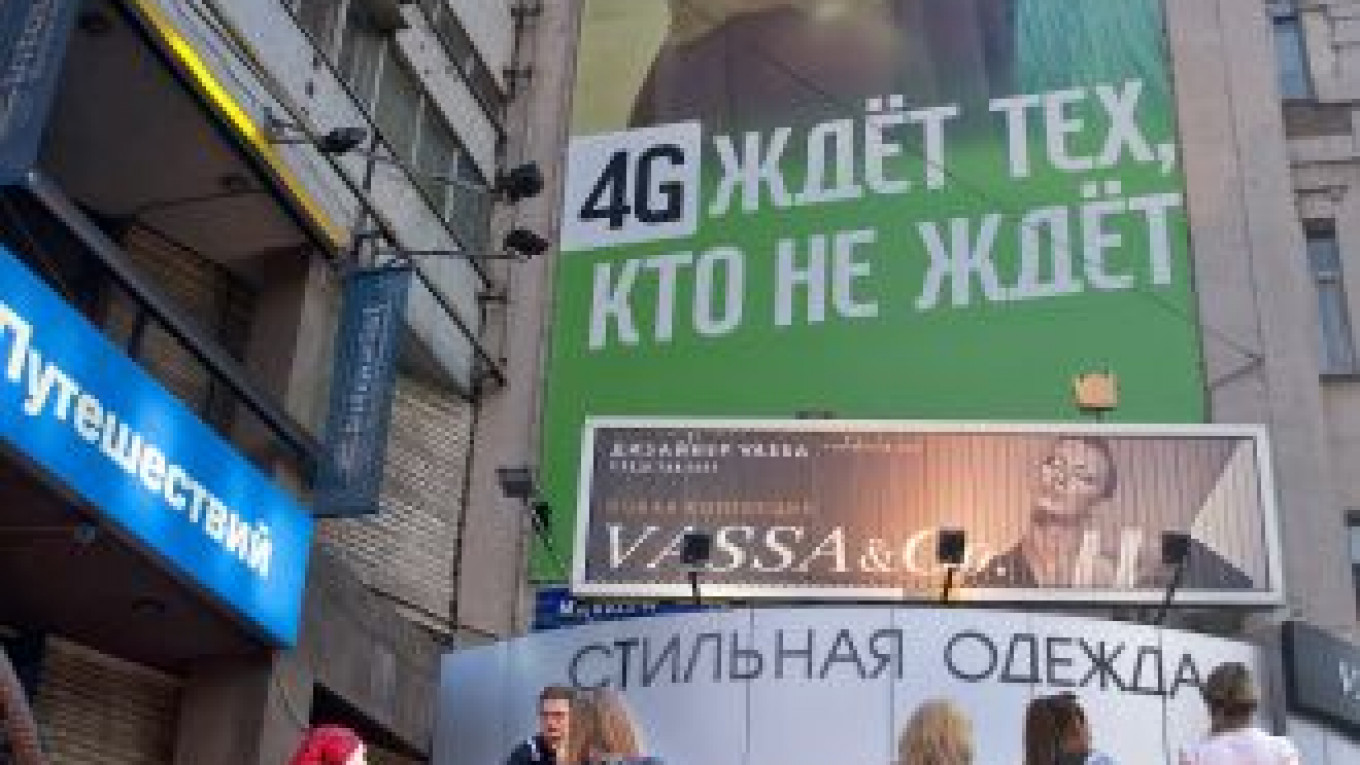The Big 3 mobile operators and state-owned telecommunications giant Rostelecom have won licenses to operate 4G mobile high-speed networks and will spend $1.8 billion a year building their networks.
In an unsurprising outcome expected by industry watchers even before the 4G tender began, VimpelCom, MegaFon and Mobile TeleSystems, as well as Rostelecom, snapped up the 4G bandwidth in contest results announced Thursday.
Roskomnadzor, the Communications and Press Ministry's regulator, ran the tender for networks that will be based on long-term evolution, or LTE, technology and published the results .
"Now there is a massive amount of work to be done by the Communications and Press Ministry, the Defense Ministry and the operators to clear the frequencies," Gulnara Khasyanova, head of the 4G Consortium, told The Moscow Times, "in order to maintain the required pace and facilitate LTE service delivery in the specified time frames."
In addition to making massive investments, the tender winners will need to work with the current holder of the 4G frequencies — the military — to avail the frequencies for civilian use and development.
Swedish-owned mobile operator Tele2, Summa Group's and national landline and Ethernet company were the losers in the tender, in which entrants had to meet criteria concerning volumes of investment in network construction, speed of rollout, and existing portfolio of licenses. There was no bidding for the frequencies, which were divided into four lots and are now assigned by Roskomnadzor to those who fulfilled the criteria.
The criteria were drawn up by Roskomnadzor in consultation with the 4G Consortium, a body composed of representatives of Rostelecom and the Big 3.
Tele2, the fourth most-popular mobile provider after the Big 3, wasn't commenting on the tender results, Tele2 spokesman Alexander Bakhorin said on Thursday.
In May, when the ministry opened the 4G application process, Tele2 Russia president Dmitry Strashnov said the company was "disappointed" with competition terms.
One of those terms — and now an obligation for each winner — is to spend at least 15 billion rubles ($457 million) annually on developing its 4G network, Roskomnadzor said. The companies have until the end of 2019 to complete the build-out, which means an annual expenditure of 60 billion rubles ($1.83 billion) and, if all four companies spend that amount from 2013 through 2019, a total outlay of 420 billion rubles ($12.8 billion).
The government awarded MegaFon of frequencies that obligates the operator to conduct the fastest and widest rollout of all the winners. That could be because MegaFon is expanding its operations by undertaking a partial merger with state-backed Skartel, a provider of 4G services under the Yota brand, Vedomosti .
Together, MegaFon and Skartel could control more than 50 percent of the 2,500- to 2,700-megahertz LTE spectrum, Reuters reported. If that happens, Communications and Press Minister Nikolai Nikiforov should step in and fix the situation, said Yuly Matevosov, a senior telecoms analyst at Alfa Bank.
The 4G license will enable Rostelecom to be more competitive. Because of the breadth of its current operations, the government-owned company can "very quickly throw up a network" for 4G, said Maxim Savvatin, a mobile analyst with iKS-Consulting.
A Message from The Moscow Times:
Dear readers,
We are facing unprecedented challenges. Russia's Prosecutor General's Office has designated The Moscow Times as an "undesirable" organization, criminalizing our work and putting our staff at risk of prosecution. This follows our earlier unjust labeling as a "foreign agent."
These actions are direct attempts to silence independent journalism in Russia. The authorities claim our work "discredits the decisions of the Russian leadership." We see things differently: we strive to provide accurate, unbiased reporting on Russia.
We, the journalists of The Moscow Times, refuse to be silenced. But to continue our work, we need your help.
Your support, no matter how small, makes a world of difference. If you can, please support us monthly starting from just $2. It's quick to set up, and every contribution makes a significant impact.
By supporting The Moscow Times, you're defending open, independent journalism in the face of repression. Thank you for standing with us.
Remind me later.


